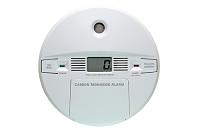Whether it happens in the middle of the night or the middle of dinner, the shrill sound of the alarm going off on your carbon monoxide detector is terrifying. You likely know how deadly this gas is. The fact that it’s also undetectable by smell or sight makes it even more dangerous. Further, exposure to high levels of carbon monoxide (CO) can result in acute symptoms in a matter of minutes, so your reaction time when you hear the alarm is absolutely crucial. However, in order to act properly and avoid serious effects, you need to know exactly what to do when your detector goes off.

When a carbon monoxide detector sounds its alarm, take a few seconds to assess what might be emitting carbon monoxide. Turn off gas-powered equipment that you can access quickly, like a stove or fireplace. Next, open as many windows and doors as you can in the vicinity, no matter what the temperature may be outside. It’s important to get as much fresh air into the home as you can right away.
Once you have performed these vital steps, immediately evacuate all family members from the home. Call 9-1-1 using a cell phone or by using a neighbor's phone. Do not reenter the home if you don't have a phone. You can also call your utility company or the fire department.
Be sure to check on family members. If someone appears to be affected by CO exposure, showing symptoms such as dizziness, a headache, vomiting or confusion -- or worse, if someone has already passed out -- call 9-1-1 immediately.
Avoiding CO hazards is relatively simple. Contact Rodenhiser Plumbing, Heating and Air Conditioning for information about utilizing carbon monoxide detectors, maintaining fuel-burning equipment or responding to CO alarms. We've provided quality HVAC service to the Route 495/128 area of Norfolk MA since 1928.
Our goal is to help educate our customers about energy and home comfort issues (specific to HVAC systems). For more information about other HVAC topics, download our free Home Comfort Solutions Guide.
Image via Shutterstock.com